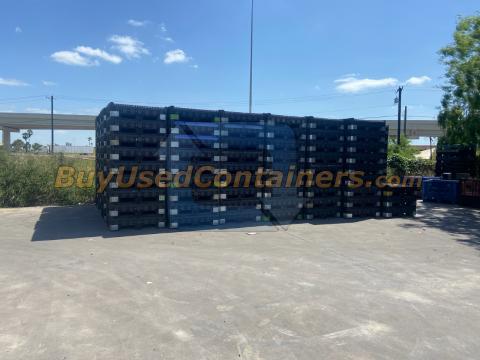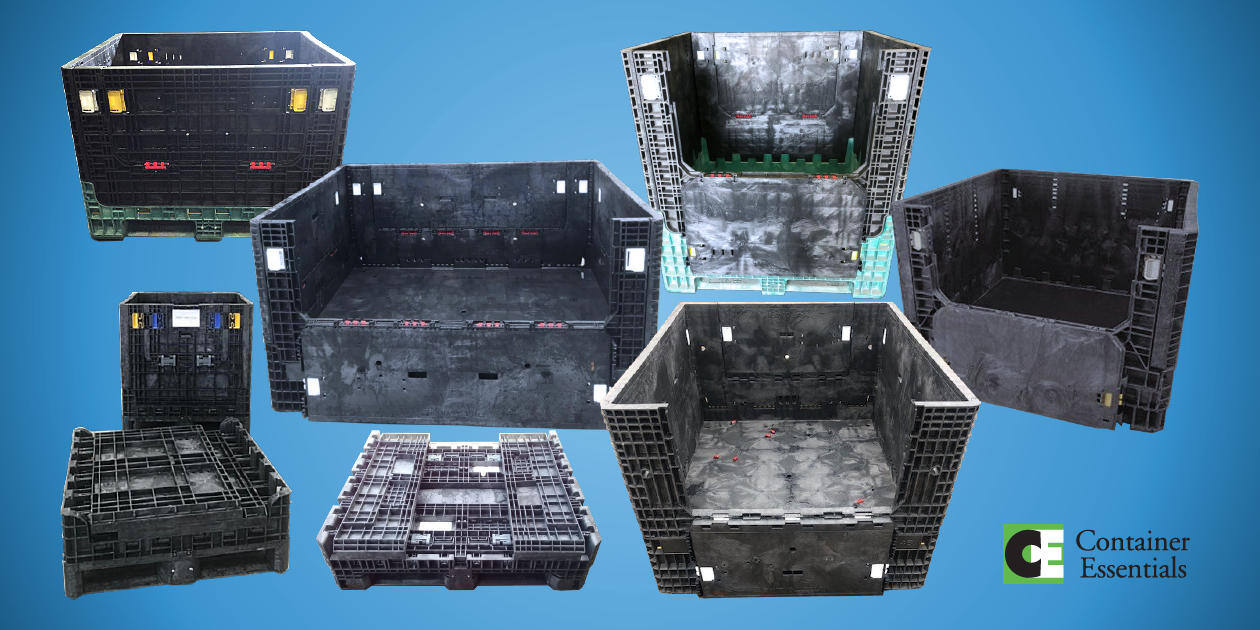Explore the versatility of used collapsible bulk containers in various industries
The Ultimate Guide to Picking the Right Bulk Containers for Your Business Needs
Picking the proper bulk containers is essential for any type of company that relies upon effective logistics. Numerous sorts of containers exist, each made for details materials and applications. Factors such as dimension, product compatibility, and regulatory standards play a considerable role in this decision-making procedure. Comprehending these aspects can result in boosted operational efficiency. Nonetheless, lots of services overlook necessary aspects that could enhance their general performance and sustainability. What are these factors to consider?
Comprehending Various Kinds Of Mass Containers
Mass containers function as necessary tools for services seeking effective storage and transport solutions. These containers come in different types, each created to fulfill particular operational demands. One usual type is the intermediate mass container (IBC), which is suitable for granulated and fluid products, supplying a balance of capability and ability to move. Another preferred alternative is the mass bag, or FIBC, ideal for dry, flowable products. These flexible containers are light-weight and can be quickly transported and stored. For larger products, rigid mass containers are often utilized, offering toughness and security for safe handling. Furthermore, there are customized containers customized for dangerous materials, ensuring conformity with safety guidelines. Recognizing the distinct characteristics of these mass container kinds enables organizations to make educated decisions that optimize logistics and reduce prices. By selecting the ideal container, business can boost their functional performance and enhance their supply chain procedures.
Key Product Considerations for Bulk Containers
When picking bulk containers, it is necessary to contemplate the products used in their building. Elements such as sturdiness, strength, and chemical compatibility play a critical function in guaranteeing the containers meet particular functional demands. Furthermore, weight and transportability issues can impact both performance and transport logistics.
Product Toughness and Strength
Toughness and strength are important factors in choosing materials for mass containers, as they directly influence the container's capacity to endure different environmental problems and handling processes. Materials such as high-density polyethylene (HDPE), polypropylene, and stainless-steel are commonly favored for their robust buildings, supplying resistance to abrasion, temperature level, and impact changes. The option of material additionally influences the total lifespan of the container; more powerful products generally lead to much less constant replacements, resulting in set you back savings over time. Additionally, the weight of the material can impact shipping expenses and simplicity of handling. Services need to consider their certain operational environments and the potential for wear and tear to guarantee peak sturdiness and stamina in their bulk container option.
Chemical Compatibility Elements
Comprehending chemical compatibility is crucial for selecting bulk containers, as the products made use of must stand up to the specific substances they will certainly hold. Various variables affect compatibility, including the chemical nature of the materials, temperature level, and duration of storage. For instance, harsh chemicals may require containers made from stainless-steel or specialized plastics that withstand deterioration. Additionally, responsive compounds can produce warm or gases, demanding vented or pressure-rated containers. The selection of container material, whether steel, polycarbonate, or polyethylene, should line up with the chemical residential or commercial properties of the saved compounds to stop breaches or leaks. Eventually, an extensive analysis of these compatibility elements ensures secure handling and storage space, protecting both personnel and the setting while preserving item stability.
Weight and Portability Problems
Selecting mass containers entails not just assessing chemical compatibility yet also taking into consideration weight and transportability. Companies must evaluate the ease of handling and transportation to maximize efficiency. Lightweight products like high-density polyethylene (HDPE) or light weight aluminum can facilitate much easier activity and decrease shipping expenses. On the other hand, larger containers may give improved sturdiness but can hinder mobility, particularly in atmospheres requiring constant relocation. In addition, the design of the container ought to enable for convenient training and stacking, making certain ergonomic security for workers. Companies must additionally think about the infrastructure readily available for transportation; for instance, containers suitable with forklifts or pallet jacks can simplify operations. Eventually, the ideal balance in between weight and portability directly influences operational effectiveness and cost efficiency.
Sizing Your Bulk Containers for Optimal Effectiveness
When sizing mass containers, organizations should meticulously assess the dimensions required to suit their specific items. Furthermore, weight ability is an important aspect that affects efficiency and safety during transport and storage space. Effective sizing not only takes full advantage of area yet also optimizes functional process.
Figuring Out Container Capacities
Selecting the right measurements for bulk containers is important for optimizing efficiency in storage space and transport. Organizations need to evaluate their details demands, taking right into account aspects such as offered space, the nature of the goods being stored, and the approaches of transport utilized. Accurate measurements ensure that containers fit ideally in vehicles and stockrooms, lessening wasted area and minimizing taking care of time. Requirement dimensions can provide comfort, however customized dimensions could be necessary for special demands or to accommodate details items. In addition, it is necessary to examine piling capabilities and ease of access, as these factors influence general functional performance. Ultimately, the ideal dimensions cause boosted organization and structured logistics, benefiting the overall productivity of business.
Weight Capability Considerations
Recognizing weight capacity is vital for companies intending to enhance their mass container performance. The weight capacity of a container directly impacts storage abilities, Home Page transport logistics, and overall functional prices. Selecting containers with the appropriate weight limitations guarantees that organizations can safely save and move their products without risking damages or conformity issues. Overloading containers can lead to structural failures, while underutilizing capability lead to lost resources. When selecting containers, it is important for businesses to analyze their product weights and consider any kind of regulatory needs. Additionally, variables such as the kind of product, meant use, and ecological conditions should likewise influence weight ability decisions. By examining these components, services can improve effectiveness and assure a structured supply chain.
Regulatory Conformity and Security Specifications

Regulatory conformity and safety criteria play a vital duty in the option of mass containers for organizations. Organizations should guarantee that their containers satisfy various laws established by neighborhood, national, and worldwide authorities. These requirements frequently concern product safety and security, architectural honesty, and proper labeling, which assist prevent mishaps and assure the secure transport of products.
Furthermore, adherence to industry-specific standards, such as those from the Fda (FDA) or the Occupational Safety And Security and Health Management (OSHA), is vital for firms handling harmful materials or food. Non-compliance can cause penalties, lawful problems, or damage to a business's online reputation.
Companies ought to also consider the container's compatibility with the products being kept or delivered to stay clear of contamination or chain reaction (used bulk containers). To summarize, comprehending and applying governing compliance and safety criteria is important for the responsible and efficient use of bulk containers
Sustainability Options for Eco-Friendly Mass Containers

Business are likewise discovering alternatives made from recycled materials, which not only save sources but also support the reusing market. In addition, developments in design enable lighter containers that need less power to transportation, further enhancing sustainability. By integrating these eco-friendly bulk container choices, organizations can show their dedication to ecological stewardship while fulfilling consumer demand for lasting practices. This shift not only assists the earth but can also improve brand name online reputation and consumer loyalty.
Cost-Effectiveness and Budgeting for Mass Containers
While several organizations concentrate on sustainability, cost-effectiveness continues to be an essential factor when selecting bulk containers. Organizations should analyze the preliminary purchase rate, in addition to long-lasting operational prices, to ensure financial viability. Variables such as toughness, maintenance, and reusability play a considerable duty in determining general expenditures.
Buying top notch containers may produce higher ahead of time prices but can result in financial savings with reduced substitute he has a good point prices and decreased waste. Furthermore, businesses must take into consideration transport expenses and storage performance, as these can affect the general budget.

Regularly Asked Concerns
Just how Do I Identify the Right Container for Hazardous Materials?
To establish the ideal container for unsafe products, one need to assess compatibility with the compound, think about the container's product, look for regulative conformity, and assess ability and safety features to guarantee appropriate handling and storage.
Can Mass Containers Be Personalized for Details Products?
Yes, bulk containers can be customized for certain products. used collapsible bulk containers. Different functions, such as material, dimension, and style, can be customized to satisfy unique requirements, making sure ideal safety and effectiveness for transporting and storing various products
What Is the Average Life-span of Various Bulk Container Kind?
The ordinary lifespan of bulk container types differs; plastic containers last 5-10 years, metal containers 10-20 years, and wooden containers normally last 3-7 years, relying on usage, maintenance, and environmental conditions.
How Should I Tidy and Maintain Mass Containers?
To cleanse and preserve bulk containers, one ought to routinely inspect for damages, get rid of deposit, wash with appropriate cleaning agents, wash extensively, and assurance correct drying before storage. Complying with manufacturer standards boosts durability and security throughout use.
Exist Rental Options for Bulk Containers Available?
Yes, various companies use rental choices for bulk containers, offering adaptability for services. These services can suit different needs, enabling business to take care of stock efficiently without the dedication of buying containers outright.
Toughness and strength are crucial elements in selecting products for mass containers, as they straight influence the container's ability to withstand different environmental conditions and dealing with procedures. Comprehending chemical compatibility is essential for selecting bulk containers, as the materials utilized must withstand the details materials they will certainly hold. Understanding weight capability is vital for businesses aiming to maximize their bulk container effectiveness. Regulatory compliance and safety and security standards play an essential function in the choice of bulk containers for services. While numerous companies concentrate on sustainability, cost-effectiveness remains try this web-site a vital element when picking mass containers.